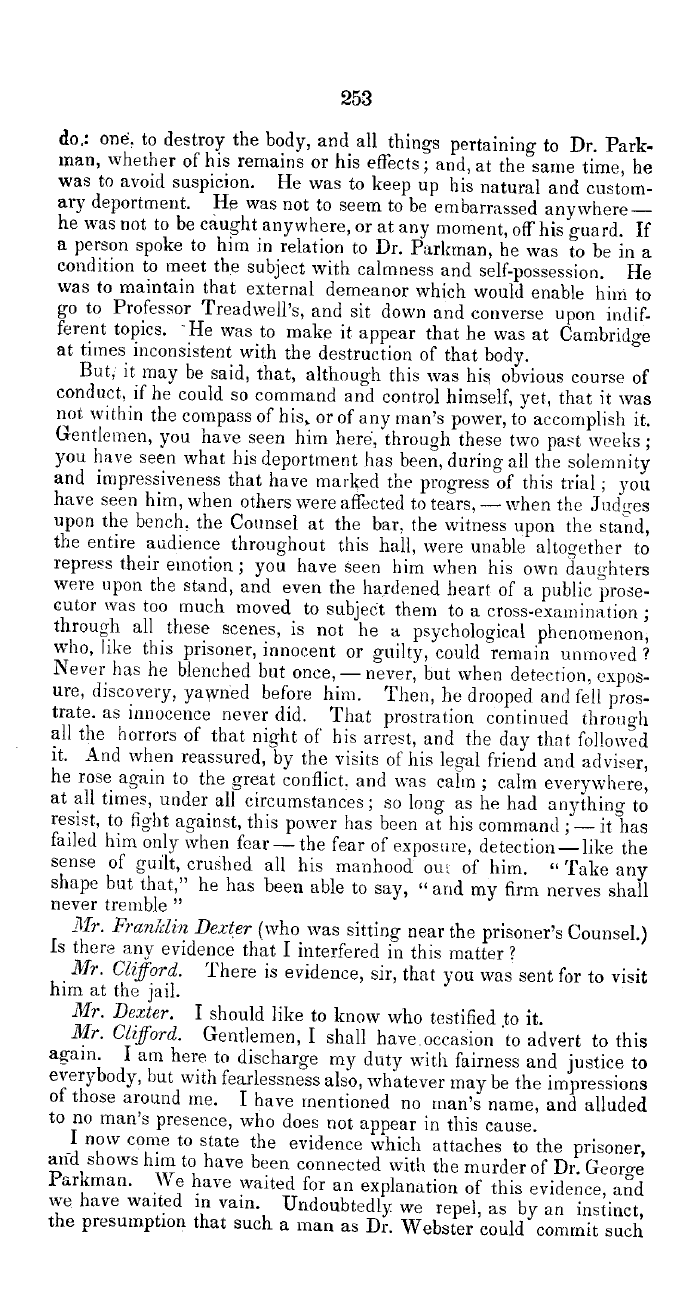|
253
do.: one. to destroy the body, and all things pertaining to Dr. Park-
man, whether of his remains or his effects; and, at the same time, he
was to avoid suspicion. He was to keep up his natural and custom-
ary deportment. He was not to seem to be embarrassed anywhere-
he was not to be caught anywhere, or at any moment, off his guard. If
a person spoke to him in relation to Dr. Parlarian, he was to be in a
condition to meet the subject with calmness and self-possession. He
was to maintain that external demeanor which would enable him to
go to Professor Treadwell's, and sit. down and converse upon indif-
ferent topics. - He was to make it appear that he was at Cambridge
at times inconsistent with the destruction of that body.
But; it may be said, that, although this was his obvious course of
conduct, if he could so command and control himself, yet, that it was
not, within the compass of his, or of any man's power, to accomplish it.
Gentlemen, you have seen him here, through these two past weeks;
you have seen what his deportment has been, during all the solemnity
and impressiveness that have marked the progress of this trial ; you
have seen him, when others were affected to tears, - when the Judges
upon the bench. the Counsel at the bar, the witness upon the stand,
the entire audience throughout this hall, were unable altogether to
repress their emotion; you have seen him when his own daughters
were upon the stand, and even the hardened heart of a public prose-
cutor was too much moved to subject them to a cross-examination ;
through all these scenes, is not he a psychological phenomenon,
who, like this prisoner, innocent or guilty, could remain unmoved?
Never has he blenched but once,-never, but when detection, expos-
ure, discovery, yawned before him. Then, be drooped and fell pros-
trate. as innocence never did. That prostration continued through
all the horrors of that night of his arrest, and the day that followed
it. And when reassured, by the visits of his legal friend and adviser,
he rose again to the great conflict. and was calm ; calm everywhere,
at all times, under all circumstances ; so long as he had anything to
resist, to fight against, this power has been at his command ;- it has
failed him only when fear-the fear of exposure, detection-like the
sense of guilt, crushed all his manhood ou; of him. °° Take any
shape but that," he has been able to say, « and my firm nerves shall
never tremble "
Mr. Franklin Dexter (who was sitting near the prisoner's Counsel.)
Is there any evidence that I interfered in this matter ?
Mr. Clifford. There is evidence, sir, that you was sent for to visit
him at the jail.
Mr. Dexter. I should like to know who testified to it.
Mr. Clifford. Gentlemen, I shall have.occasion to advert to this
again. I am here to discharge my duty with fairness and justice to
everybody, but with fearlessness also, whatever may be the impressions
of those around me. I have mentioned no man's name, and alluded
to no man's presence, who does not appear in this cause.
I now come to state the evidence which attaches to the prisoner,
and shows him to have been connected with the murder of Dr. George
Parkman. We have waited for an explanation of this evidence, and
we have waited in vain. Undoubtedly we repel, as by an instinct,
the presumption that such a man as Dr. Webster could commit such
|

